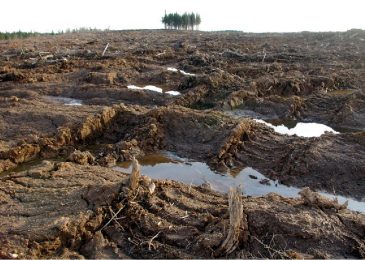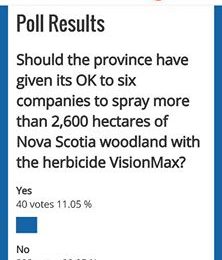KJIPUKTUK (Halifax) – Don’t worry about this fall’s planned glyphosate spraying in our forests, says Dr. Robert Strang, Nova Scotia’s chief medical officer of health.
 Dr. Strang’s statement came on the heels of the province’s approval of the applications of Northern Pulp and five other companies to spray more than 2,600 hectares of woodland with VisionMax, a herbicide containing the active ingredient glyphosate. In forest management glyphosate kills the hardwood, that pulp-producing forestry companies do not want.
Dr. Strang’s statement came on the heels of the province’s approval of the applications of Northern Pulp and five other companies to spray more than 2,600 hectares of woodland with VisionMax, a herbicide containing the active ingredient glyphosate. In forest management glyphosate kills the hardwood, that pulp-producing forestry companies do not want.
“There is no evidence that glyphosate creates a risk to human health if used properly and if the Department of Environment is monitoring where, how, and when it is used,” said Dr. Strang in a news release issued last week by the provincial Department of Health and Wellness..
“Even water can be toxic if too much is consumed in a short period of time. The difference is between the possible hazard and the real-life risk,” Dr. Strang said.
Yet such statements are not likely to reassure many deeply worried residents of rural Nova Scotia.
First of all, Dr. Strang’s view is not one that is shared unanimously among scientists. For every endorsement there exists a countervailing opinion from somebody with equally impressive scientific credentials.
For instance, last week Francis Campbell of the Local Xpress spoke with New Brunswick wildlife biologist Rod Cumberland, who takes issue with just about any part of Strang’s defense of the herbicide.
Cumberland also raises several issues that are not addressed in Strang’s statement. What do we know about other toxic ingredients in the herbicide mix, he asks. And how well is its application actually monitored?
In Europe Italy, France, Sweden and the Netherlands oppose a new 15-year licence for glyphosate that a European Union meeting had been expected to rubber stamp.
The author of a report by the World Health Organization (WHO) that supposedly debunked an earlier report critical of the herbicide by the same organization was subsequently accused of a conflict of interest.
 As well, defenders of glyphosate have focused on the supposedly negligible risks of the herbicide to humans. Nonetheless, signs in the areas to be sprayed are warning people not to eat berries. Did we remember to tell the birds also?
As well, defenders of glyphosate have focused on the supposedly negligible risks of the herbicide to humans. Nonetheless, signs in the areas to be sprayed are warning people not to eat berries. Did we remember to tell the birds also?
And did we tell the earthworms to vacate the premises prior to spraying? A report by the British Soil Association suggests that in terms of glyphosate’s impact on soil ecosystems we know very little, which is not a good thing.
All this suggests that the jury is still out on the potential harms of glyphosate, and that Dr. Strang’s news release is unlikely to reassure the many Nova Scotians who are uncomfortable with the proposed spraying program.
That’s not all.
What the scientific evaluations ignore is that risk is never a standalone consideration. People weigh risk in the context of potential benefits and available options. For instance, people tend not to care about risks associated with an activity if there is no other option. And people are willing to take more risk if they want something very badly.
 In the case of glyphosate spraying there are other options. And what the spraying enables does not appeal to them anyways.
In the case of glyphosate spraying there are other options. And what the spraying enables does not appeal to them anyways.
After all, the bottom line is that the spraying program is not really necessary. All it does is save a handful of forestry companies a bit of money by making clearcutting more efficient.
It’s a safe bet that most Nova Scotians are not in favour of clearcutting in the first place. Clearcutting doesn’t generate the kinds and numbers of jobs sustainable forestry management practices provide. Promoting softwood species over hardwood also reduces the resilience of our forests, not a trivial issue in the face of global warming.
Should bureaucrats and government politicians care more about a couple of forestry companies eager to marginally improve their profit rates, or should they listen to the people who elected them and pay their salaries?
The answer seems pretty clear cut.




To respect an environment that we share is to recognize its parts as as a whole; species found together in an area affect one another in complex interactions. Responding to legitimate concerns over spraying Vision-Max with simplistic ideas, such as water and salt can both harm humans at enough dosage, is insulting to the detailed and well formed concerns voiced, and should be embarrassing to the responders (Strang and Miller). The people of Nova Scotia and their environment depend on good governance in the interest of all.
Since when did hardwood become an inconvenience (other than to the pulp industry)? Allowing an industry to wipe out an integral part of our ecosystem simply because it is costs them more or earns them less is abhorrent and dangerous. Eliminating the NS Film Tax Credit was a mistake obvious to all, but the next government can correct that mistake. Chemically destroying an ecosystem is irreversible. Even when looking only at the immediate human health impact issue, which as I have just outlined is one part of a large and ugly situation, it is shameful that both our Environment Minister and CHO tout industry-funded, old and incomplete science.
A cynical view of the matter, as simply industry=jobs=whatever-industry-wants-it-gets, cannot even explain this terrible political move. As government has been advised for many years, sustainable and responsible forestry practices such as those of Port Hawkesbury Paper actually create *more* jobs per hectare.
As a society, what are we prepared to allow industry to do in the interest of their own profit? If Northern Pulp demands that Occupational Health and Safety regulations be relaxed, will that be okay? If they demand exemptions from the minimum wage, will they be added to the list just like the hockey clubs were? It is a slippery slope with considerable implications. NS is an amazing province and seen as such by more and more individuals and organizations from elsewhere. Let us support and attract the constructive and creative ones and let the destructive dinosaurs seek more desperate jurisdictions. Green is not just the colour of money.
Very well said!
WOW! Tout à fait d’accord avec ça.
I don’t see that Dr Strang has the qualifications to say such a thing. He has no background in chemistry or toxicology.
He is a doctor who does…I don’t know what. Just another MacNeil govt stooge toeing the party line.
Green, ecosystem aspects noted. In other provinces it is the hardwood that has added value to the forests, but here we cannot allow anyone except the major mills access to the Crown Lands, save a few company contractors. Both these mills are near extinction given the pending softwood lumber agreement. Why spray at this point, just delay the spraying until after October 15th. This is the most damning direction the liberals have taken to date, especially to what I am told as I have not checked the stats is 40% of their electorate. Has both ministers combined Mr. Hines and Miller? Environment Minister taken us back to the cave man days. At least the Natural Resources minister is pandering to what will be an extinct industry. By the way when ever has Dr. Strang weighed in on such matters. What is
Very well stated, A. Tuton! Our government should be ashamed that they have decided to compromise the safety and well being of our wildlife and possibly we humans, for the sake of fattening the coffers of the pulpwood industry, who have in turn no doubt dangled a carrot or two to help the powers that be decide in their favor. Money has a loud voice.